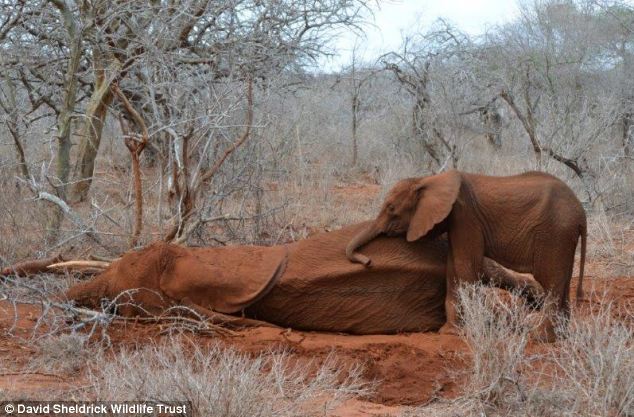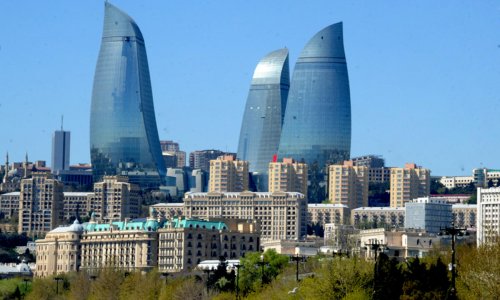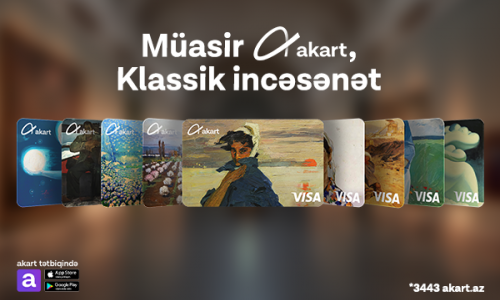Zongoloni spent the last moments with her mother who died from wounds inflicted by poachers hoping to steal her tusks and was found grieving by a wildlife rescue team two months ago.But the one-year-old calf has found new friends in the keepers and other orphaned elephants at Kenya's only elephant orphanage in Nairobi National Park and is ‘strongly willed’ and a little greedy, as her rehabilitation begins.Zongoloni was rescued by the David Sheldrick Wildlife Trust (DSWT) as she cuddled her mother who lay dying from a gunshot wound to her leg.In September a gang of poachers shot at the animal and while a mobile veterinary unit tried to remove shattered bone and treat her wounds, they could not rule out the possibility of a bullet still being embedded within the bone and were worried about her future.Two weeks after the attack the large elephant collapsed and could not stand, leaving milk-dependent Zongoloni to guard her, even though the calf was scared and confused.Sadly, the Kenya Wildlife Service had to euthanise the mother who was in crippling pain from her wounds and after spending final moments with her mother, the calf was tranquilised and flown to Kenya’s only elephant orphanage, based in Nairobi National Park to recover with other young victims of the ivory trade.At the orphanage, Zongoloni now spends time with calves and keepers 24 hours a day, travelling with them as a group during the day, and sleeping alongside them within a stable at night.Keepers in Kenya told MailOnline that Zongoloni was initially understandingly very untrusting of them, given her experience with humans so far.However, she is slowly building bonds with the people who care for her that will last a lifetime.‘In Zongoloni’s case, since her rescue she has been grieving for her lost family and during the day, chooses to spend some time alone,’ they said.‘Like humans, elephants grieve for their loved ones just as acutely and so this is completely natural and a process that the orphanage has seen many times over. The daily routine of the orphanage and constant contact with the other orphans, including her friends Oltaiyoni and Lima Lima who she enjoys to walk with, provides respite from the grieving process and keepers hope that in the next few months it will gradually subside.Zongoloni’s keepers said she is a ‘very independent and strong willed little elephant’ ‘For many orphans, losing their mother can prove too much to bear and many lack the will to survive through this loss, but Zongoloni’s strong spirit shows she has chosen the choice of “life” and she is a survivor - something that will aid her in years to come during the reintegration process,’ they said.‘At the moment, she is very greedy for her milk feeds and dairy cubes from the Keepers and loves her hand-picked greens.’While Zongoloni is still grieving her mother, her unique personality is emerging and the keepers said some of the orphans, like Kithaka are incredibly mischievous and ‘enjoy teasing visitors and engaging in lots of pushing bouts’.Zongoloni is one of the quieter elephants in the herd but she still plays in the mud bath and socialises with the other orphans.‘Each orphan that reintegrates into the wild has their own traumatic story that they have overcome,’ the charity said.‘The young calves are hugely vulnerable and because of this it is vital the interaction between elephant and keeper is sustained.’However, because elephants are so emotionally intelligent, keepers are alternated regularly to avoid an extra level of distress for an orphan if their chosen keeper is away.‘In the past, we have sadly experienced the death of an orphan due to this separation, as young elephants are known to pass away due to a broken herd,’ the charity said.‘The care and love provided from each Keeper is paramount to the survival of the orphans and we ensure our locally employed Keepers are with us for around 10 years to avoid added emotional distress for the orphans,’ it added.Bottle feeding is a relaxing time for the orphans and the keepers regularly hang large blankets when the elephants are feeding because it gives them an extra level of comfort as calves rest their trunk on the blanket as they would their wild mothers.‘It is our duty to protect these vulnerable elephants, I will never stop being a Keeper’ said Goya Golicha, a keeper at the orphanage.Zongoloni will be released into Tsavo Natural Park when she is ready, which might be when she is between eight and 10 years old.The charity said it is difficult to predict the future of the orphans due to the current poaching situation in Africa, but many of the elephants revist the orphanage with their wild born calves to welcome new arrivals and often when they have been injured by poachers or hidden illegal snares.In a few years Zongoloni will join the older orphans at either Voi or Ithumba Reintegration Units to slowly become accustomed to a wild life among Tsavo’s famous herds to start her own family.She is one of 49 infant elephants rescued by the DSWT this year and her story shows the real cost of an ivory poaching crisis that kills a staggering 36,000 elephants across Africa every year. Elephants with calves and entire herds are slaughtered for their ivory, prized in the Far East in countries including China, for ornaments and figurines.Dame Daphne Sheldrick, founder of the DSWT said: ‘Individual personalities and family histories are lost each time an elephant is slaughtered for its ivory, with innocent milk-dependent calves like Zongoloni paying the price for man’s greed for ivory. ‘In these terrible times for Africa’s elephants, our anti-poaching teams and mobile vet units are on the front line against poaching everyday providing immediate aid and protection to wild elephants and rescuing those that are found orphaned.’The DSWT charity is currently looking for people to 'foster' elephants for £30 a year.(dailymail.co.uk)ANN.Az
How an elephant orphanage saved Zongoloni - PHOTO
Society
16:33 | 21.12.2013

How an elephant orphanage saved Zongoloni - PHOTO
A baby elephant, who was found guarding the body of her dying mother, has been rescued and is now rebuilding her life in Kenya’s only elephant orphanage.
Follow us !










